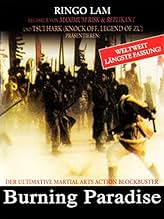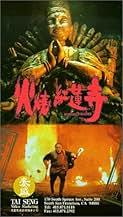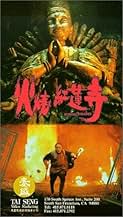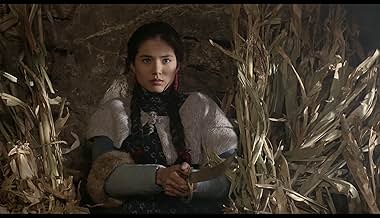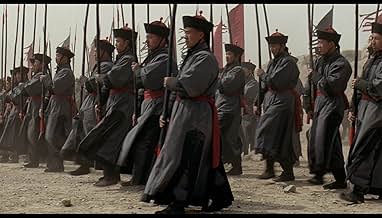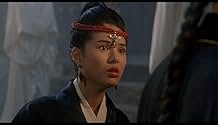AVALIAÇÃO DA IMDb
7,0/10
1 mil
SUA AVALIAÇÃO
Os monges Shaolin usam suas habilidades mortais do kung fu contra os perversos seguidores da dinastia de Manchu, na China.Os monges Shaolin usam suas habilidades mortais do kung fu contra os perversos seguidores da dinastia de Manchu, na China.Os monges Shaolin usam suas habilidades mortais do kung fu contra os perversos seguidores da dinastia de Manchu, na China.
- Direção
- Roteiristas
- Artistas
- Direção
- Roteiristas
- Elenco e equipe completos
- Produção, bilheteria e muito mais no IMDbPro
Avaliações em destaque
Yes, a well-choreographed martial arts melodrama from Ringo Lam. It is relentlessly bloody, adding a certain black-magic flair with the repulsive arch-villain in the story. Shaolin monks fight for their survival against Qing dynasty henchmen who are in hot pursuit of the monks. A number of kungfu battles ensue, building to the climatic ending with Shaolin masters against the black arts. Of particular interest is the view of the Qing dynasty as a source of evil in China. In fact they were regarded as "foreign invaders", eventually "ousted" in the early 20th Century. Today, due to political expediency, the Chinese communist party has chosen to delete this historic inconvenience from official history, as they refuse to admit that China today actually represents several previously autonomous regions.
10winner55
This is one of the finest films to come out of Hong Kong's 'New Wave' that began with Tsui Hark's "ZU: Warriors of Magic Mountain". Tsui set a tone for the New Wave's approach to the martial arts film that pretty much all the directors of the New Wave (Jackie Chan, Sammo Hung, Wong Jing, Ching Siu Tung, etc.) accepted from then on as a given; namely, the approach to such films thenceforth would need more than a touch of irony, if not outright comedy. "Burning Paradise" put a stop to all that, and with a vengeance.
It's not that there isn't humor here; but it is a purely human humor, as with the aged Buddhist priest at the beginning who somehow manages a quick feel of the nubile young prostitute while hiding in a bundle of straw. But this is just as humans are, not even Buddhist priests can be saints all the time.
When irony is at last introduced into the film, it is the nastiest possible, emanating from the 'abbot' of Red Lotus Temple, who is a study in pure nihilism such as has never been recorded on film before. He is the very incarnation of Milton's Satan from "Paradise Lost": "Better to rule in Hell than serve in heaven!" And if he can't get to Satan's hell soon enough, he'll turn the world around him into a living hell he can rule.
That's the motif underscoring the brutal violence of much of the imagery here: It's not that the Abbot just wants to kill people; he wants them to despair, to feel utterly hopeless, to accept his nihilism as all-encompassing reality. Thus there's a definite sense pervading the Red Temple scenes that there just might not be any other reality outside of the Temple itself - it has become all there is to the universe, and the Abbot, claiming mastery of infinite power, is in charge.
Of course, fortunately, the film doesn't end there. Though there are losses, the human will to be just ordinarily human at last prevails. (If you want to know how, see the film!) Yet there is no doubt that, in viewing this film, we visit hell. Hopefully, we do not witness our own afterlives; but we certainly feel chastened by the experience - and somehow better for it over all.
It's not that there isn't humor here; but it is a purely human humor, as with the aged Buddhist priest at the beginning who somehow manages a quick feel of the nubile young prostitute while hiding in a bundle of straw. But this is just as humans are, not even Buddhist priests can be saints all the time.
When irony is at last introduced into the film, it is the nastiest possible, emanating from the 'abbot' of Red Lotus Temple, who is a study in pure nihilism such as has never been recorded on film before. He is the very incarnation of Milton's Satan from "Paradise Lost": "Better to rule in Hell than serve in heaven!" And if he can't get to Satan's hell soon enough, he'll turn the world around him into a living hell he can rule.
That's the motif underscoring the brutal violence of much of the imagery here: It's not that the Abbot just wants to kill people; he wants them to despair, to feel utterly hopeless, to accept his nihilism as all-encompassing reality. Thus there's a definite sense pervading the Red Temple scenes that there just might not be any other reality outside of the Temple itself - it has become all there is to the universe, and the Abbot, claiming mastery of infinite power, is in charge.
Of course, fortunately, the film doesn't end there. Though there are losses, the human will to be just ordinarily human at last prevails. (If you want to know how, see the film!) Yet there is no doubt that, in viewing this film, we visit hell. Hopefully, we do not witness our own afterlives; but we certainly feel chastened by the experience - and somehow better for it over all.
I have always been keen on watching Hong Kong movies, but all of them failed to meet my expectations...until now! BURNING PARADISE doesn't contain the flat humor most HK movies have, nor a second rate story line that has been dragged into the film. The story is not complex, but there are never scenes that are just there to fill some "intelligent" space (the only truely intelligent martial arts film I have seen is CROUCHING TIGER, but since Hollywood is involved it is no true HK movie for me). There are some incredible fight scenes in this movie, from the first one(which is one of the coolest I have ever seen, yet so short) to the last main scenes! But mind, there's also a lot of blood that flows (people cut in half, decapitated, etc). The production is pretty good and the special effects show that the fantasy of the writer can be fulfilled even though some shots must be pretty technical (notice: the sheet of paper that he throws and got pinned into a wall!). Yep, it's not Tsui Hark or John Woo that made my favorite Hong Kong film, it's Ringo Lam! And I'm sure as hell going to check out more from this director! Ace.
Nasty unrelenting action set in a prison that's itself a really creepy and important "character".
Top-notch wire work, good mix of fighting styles (including paint-fu!), and fine production values -- with the sore exception of some rubber weapons in the crowd scenes.
9 out of 10.
Top-notch wire work, good mix of fighting styles (including paint-fu!), and fine production values -- with the sore exception of some rubber weapons in the crowd scenes.
9 out of 10.
The Red Lotus Temple, where most of Ringo Lam's "Burning Paradise" takes place, is a real house of horrors. The temple prison is where followers of Shaolin are taken, mostly to be killed in various gruesome ways. The lead character, Fong Sai Yuk, is a Chinese hero who has appeared in other movies, such as the two starring Jet Li. Here, Fong Sai Yuk's opponent is the insane military man who controls the temple. This guy is impervious to weapons, as Fong finds out early in the picture. More than anything else, "Burning Paradise" is a horror movie. Instead of a haunted house where visitors die, you have prisoners in a temple in which there seems to be no escape. Still, the movie is well made. If this movie were released in the US, it would easily get an R-rating for violence.
Você sabia?
- CuriosidadesNot related to the previous two Fong Sai-Yuk movies with Jet Li. Even if this was released only a year later and has some of the same style of comedy and martial arts action.
- ConexõesRemake of Templo da Lotus Vermelha (1965)
Principais escolhas
Faça login para avaliar e ver a lista de recomendações personalizadas
Detalhes
Contribua para esta página
Sugerir uma alteração ou adicionar conteúdo ausente

